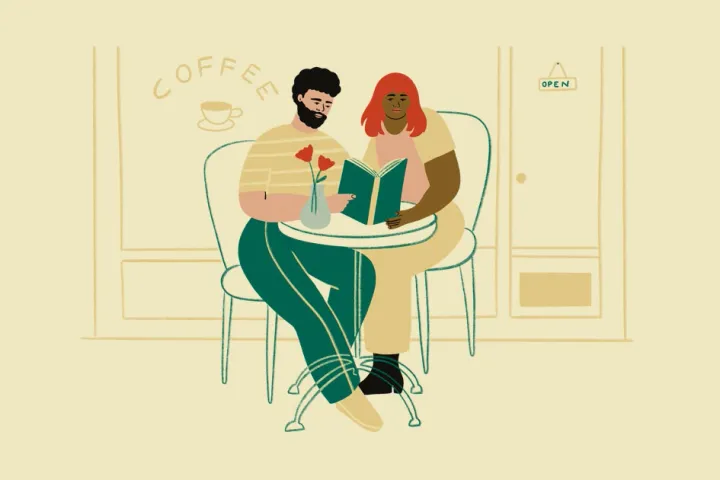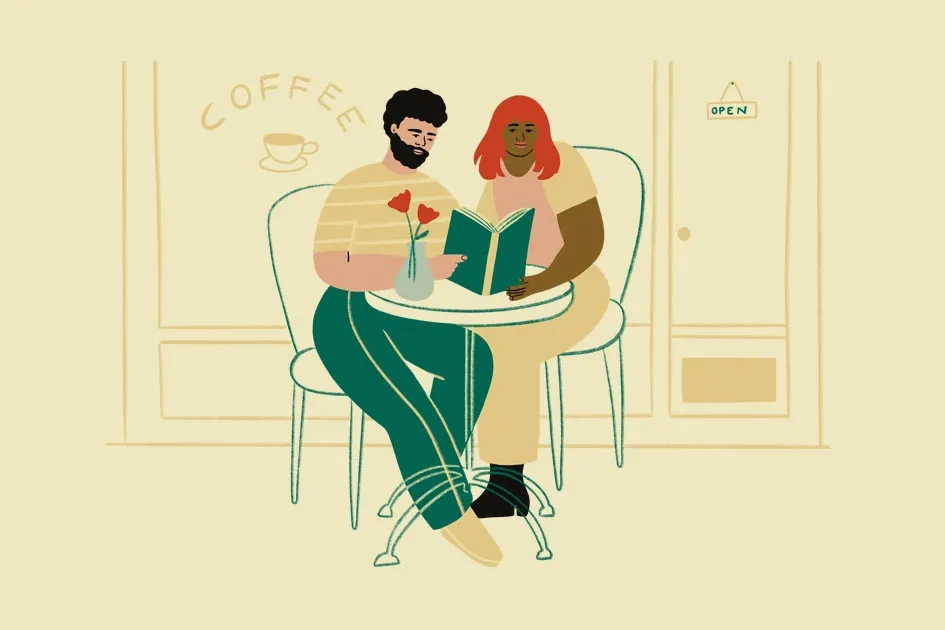The four-flight stairway of this Gothic-inspired church is steep and winding—to peer over the edge into its coiling descent is enough to make anyone grab hold of the banister and proceed slowly. But though he’s blind, Tibor Miklós takes each step quickly, with one hand on his guide’s forearm and the other holding his white cane.

The hall below is brimming with people, most of them blind. They’ve come to this church in Szeged, Hungary, a city just north of Serbia, to receive a Bible they can finally “read” on their own—the In Touch Messenger in Hungarian.
For two weeks Tibor has been bumping over the highways of Hungary, sharing Messengers and uniting Baptist, Lutheran, Methodist, Pentecostal, and Reformed believers. They have joined Tibor in his mission to reach the forgotten ones—the blind and disabled, the undereducated and the marginalized. The Son of God had compassion on these, and now, through Tibor, the church in Hungary is turning its face to them with a renewed focus.

But it is only the beginning. There are outcasts from within the church, and then there are outcasts from without. Before his travels are complete, Tibor will go to the ones on the outside—the Roma people—who have often given up hope that they will ever be let in.
Isolated and Forgotten
As a young boy, Tibor was surrendered by his parents to Orphanage One—Romania’s infamous casa de copii, or “children’s house,” where in 1990, after the fall of Nicolae Ceausescu, British officials discovered toddlers tied to urine-soaked beds. Tibor lived in one of its buildings from the late 1960s until 1983. He had his sight then, but saw only squalor and hopelessness.
His one respite was the summer, when the farmers would come to select an orphan for their heavy work. “They treated me like a slave,” remembers Tibor. “They did not let me sleep in their home. I couldn’t eat at the same table with them.” Still, his summers were better than being in the orphanage, where his only hope was to run away.
He had no one to tell him about God, no evidence of the Bible in a Communist state—with the exception of one farmer’s family. They took Tibor to a confirmation class, perhaps as a salve for their conscience. And though he passed the exam, he comprehended none of it.
As a teenager, he started to lose his sight. The diagnosis was retinitis pigmentosa, a genetic eye disease that gradually diminishes one’s vision until all that remains is the smallest speck of light. Eventually even that light gives way to darkness. But even as Tibor’s sight began to fail him, he was not to be deterred.

Once he was free of the orphanage, he entered college and began earning money as a physical therapist in nearby Hungary. Now I have money, he thought. Let’s see how I can be happy. But he made poor choices that only increased his sorrow. The emptiness he felt seemed worse than being in the orphanage.
Then he became close with Márta, a girl he’d known since primary school. The two of them shared this genetic eye disease—and knew they would eventually go blind together. When Tibor proposed marriage, Márta accepted with one condition: They would not have a child. “When you are young,” laughs Tibor, “you just want to have that woman.”
After the wedding, Márta’s remaining vision went quickly. Hit hard by the finality of her blindness, she grew bitter. It was a challenging time that almost destroyed their relationship and left Tibor wondering if marriage to Márta had been the right decision. He was prepared to give up on her.
Blind, But Seeing
One day some Christians came knocking at the door, and Tibor let them in, interested to see what kind of God they had. He wasn’t completely blind but told them he could no longer see well enough to read. He thought one visit was enough for the missionaries—that maybe his disability would keep them away. Instead, they offered to record the gospel of John for him on a cassette tape. “That was the first time in my life I read and heard about the Bible,” he says. He listened to the tape and challenged the Christians to explain how a good God could put him in an orphanage and allow him to go blind.

But the Lord would have His man. “God just opened my spiritual eyes, and I understood,” remembers Tibor. “I knew I was empty and sad. I knew I wanted to get rid of that.” Christ came in, and Tibor and Márta were changed.
First, Tibor began refusing the customary—and unethical—tips that came to him as a perk in his profession. Then he began to stop people in the streets, asking, “Do you know Christ personally?” Márta feared for his safety. With the recent demise of the Hungarian Socialist Workers’ Party, his uncommon boldness was risky in the current political climate. Still, they enrolled in Bible study classes with Campus Crusade for Christ—the same organization that had sent those Christians to their door.
It was during a house church gathering one day that a little girl about 2 years old jumped into Tibor’s arms. Oh my gosh, he thought, I want a child of my own. So he prayed, and five years later, Márta realized she wanted a child, too.
That was when God gave them Noémi.
A few months before their daughter’s first birthday, Márta and Tibor had doctors test her for their disease. And there were many doctors—all very curious about what they’d find. Yet throughout the tests and the wait for results, Tibor kept smiling. The physicians thought he was crazy to have joy at such a time, so he shared the gospel with them, describing the healing in John 9. After explaining the disciples’ question about why the man had been born blind, he quoted Christ’s response: “It was so that the works of God might be displayed in him” (John 9:3). On hearing himself pronounce these words, Tibor realized that this was God’s desire for his life: to let Jesus’ name be glorified through his blindness.
God had called Tibor Miklós into ministry. And Noémi did not have retinitis pigmentosa.

Called to the Forgotten
A few years ago Tibor lost the rest of his vision. And at first, the depression and bitterness that had initially consumed Márta also weighed heavily on him. He was pastoring a church, dealing with the aftershocks of a suicide in the congregation, and taking a stand for integrity, which would ultimately cost him his government job. Discouraged and overwhelmed, he wallowed in his pain, tempted to give up. Again he remembered John 9. When Jesus revealed Himself as the Son of God, the man healed of blindness said, “Lord, I believe” and worshipped Him (John 9:38). “I knew I had to believe,” Tibor says. “I had to go on. I told God, ‘It doesn’t matter. These next years, I want to live for Your glory. I don’t understand, but here I am.’”
Today is another stop in this long journey across Hungary, and now Noémi is at her father’s arm. She’s 19 and enrolled in Bible school, her decision to pursue ministry a sweet surprise to her parents. She guides Tibor under a clothesline and up a step, into a home with a plastic sheet for a door. It’s a meager dwelling, made worse by the absence of electricity, water, and plumbing. These were disconnected long ago for insufficient funds.

Nineteen Roma people live together under its roof, and many others fill the homes along this rural street. A Messenger can do wonders in such an environment, where years of prejudice and hardship have left generations in seemingly hopeless circumstances. It’s an encouragement to the Roma parents who are trying to change the future for their children, and it offers true hope in Jesus Christ. For Tibor, the Messenger provides an open door to relationship with those who have been betrayed and forgotten. “I think I am giving the most valuable treasure into people’s hands,” he says.
Tibor’s ministry to the blind and disabled is growing and will continue, but for the Roma, he is just getting started. Commonly referred to as Gypsies—now thought to be a derogatory term—the Roma share a long history of migration and rejection wherever they settle. The families Tibor visits today face many obstacles, but they have rejected the path of crime others have followed. And though there are thousands of Roma homes to enter, Tibor desires to reach all he can.
A Dawning Light
It’s 6:30 on Monday morning. This is Tibor’s first day off after covering so much of the country—providing Messengers to church assemblies, to dormitories for the blind, and to several households of marginalized Roma people. It was a trip six months in the making. But that doesn’t prevent his phone from ringing.
He sits up in bed and answers. There’s a woman’s voice in his ear: “Sir, I cannot turn on this Messenger. I cannot have my quiet time.” Tibor troubleshoots the problem, going over the buttons, reminding her to let the solar panels charge in the sun. “You might imagine that I was angry,” he says, “but I was so happy. People are excited. They want to have God’s Word.”

Tibor has a calling, and though it can seem unending and beyond difficult, he is ever expectant and always encouraged. “My help comes from God,” he says. “I am ready, and I would like to do my best to help Hungary.”
Sometimes, when the sun meets the horizon, for just a few moments Tibor can see again. It’s but a glimmer, the enchanted light somehow working with his brain to create a faint image of a tree or the elusive features of his wife and daughter in soft-focus. Like time, these moments are fleeting. Tibor can’t predict when they’ll come, but he can sense the dawning light for Hungary. It’s in the churches as they unite, in the crowds that gather, and in the joy of so many grateful voices.
Photography by Ben Rollins





